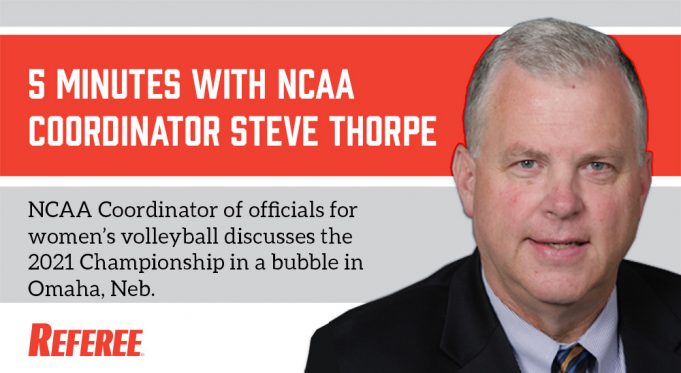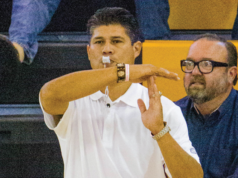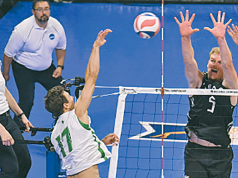NCAA coordinator of officials for women’s volleyball discusses the 2021 Championship in a bubble in Omaha, Neb.
Residence: Doylestown, Pa.
Experience: Currently the NCAA coordinator of officials for women’s volleyball. Began officiating NCAA volleyball in 1985 and was selected to work six NCAA Division I Women’s Volleyball Championships. Inducted into the Professional Association of Volleyball Officials Hall of Fame in 2013. Served as the USA Volleyball rules interpreter from 2000-13 and refereed on the international level from 2001-14.
REFEREE: Overall, how did you feel about this year’s championship?
THORPE: I wouldn’t have missed it for the world and I hope we never have to do (the bubble) again. I am sure I am not the only national coordinator with that feeling in all the sports as they go through their championships. Overall, I think it went outstanding. If you can get 48 of the best NCAA teams in the country and a group of 60 of the best officials in one area, one facility, for about a six- or seven-day event, we’d sign up for that every year, but not under these conditions.
REFEREE: How was the assigning process different this year?
THORPE: Usually, you go to a first/second round site and everyone works the first round, and then half the people work the second round because there’s only one match instead of two. In this case, there were 16 matches round one, there were 16 matches round two. So, everybody was going to work the first and second round. It was fantastic from an assigning point of view in that we had lots of choices in that if something didn’t go so well on one court with one team, that official didn’t have to see that team the next day at all. But I also likened it to the Cheesecake Factory menu; you got way too many choices perhaps.
REFEREE: The R2 had to go to the opposite side of the court for reviews. Were there any challenges with that?
THORPE: Virtually to a person, this was not the first time they had to do that this season. It took a little time. Everybody had headsets here. What that did enable you to do was to talk to your partner a little bit on the way over and then also talk to them on the way back telling them the result of the play.
REFEREE: The night before the championship match, you have the semifinal officials gather to discuss plays from their matches. What does that experience allow you to do?
THORPE: With the advent of video and in our training sessions preseason, there is a request for more and more video because there are so many different situations. It’s like any sport, you can talk about what the rule is and you can talk about a situation, but then a unique situation presents itself in the application of a certain rule and the video evidence is a great teaching tool. We found that better and more video in the teaching aspect is vital. The crews will tell you they are more nervous going into that than into their matches. It’s great for the general cadre to see even officials at this level are human. That’s also a time when we usually announce the final crew for the next night. It is the worst-kept secret in volleyball by that point, but that’s when we recognize the crew and make kind of a little, big deal about who is going to be refereeing the final match.
REFEREE: What stands out from this year that sums up 2020-21?
THORPE: In the Finals review, normally we have the crew all together. At first, I said everybody get on your own computers, your own room. Although there was not a crew chief, Devonie McLarty, who ended up being the first referee on the final, she would be the one who would get a sense of the crew and she’d be honest with me. She said, “This crew was special and we really bonded well, and we’d like to be in the same room as we do the semifinal analysis.” They had the same setup like they would at a normal convention. That was something that showed what teamwork was. That stuck out in my mind. During play, I’d say for me, and I didn’t expect any different, the happiness that it seemed like the players were experiencing just being able to play.
What's Your Call? Leave a Comment:
Note: This article is archival in nature. Rules, interpretations, mechanics, philosophies and other information may or may not be correct for the current year.
This article is the copyright of ©Referee Enterprises, Inc., and may not be republished in whole or in part online, in print or in any capacity without expressed written permission from Referee. The article is made available for educational use by individuals.
















